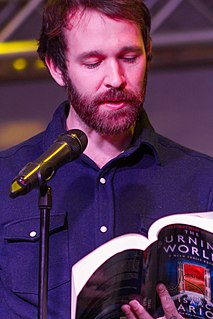A Quote by Paul Washer
We find or invent the cleverest means of attributing our sins to anything or anyone outside of ourselves.
Related Quotes
The Zen Master warns: 'If you meet the Buddha on the road, kill him!' This admonition points up that no meaning that comes from outside of ourselves is real. The Buddhahood of each of us has already been obtained. We need only recognize it. Philosophy, religion, patriotism, all are empty idols. The only meaning in our lives is what we each bring to them. Killing the Buddha on the road means destroying the hope that anything outside of ourselves can be out master. No one is any bigger than anyone else. There are no mothers or fathers for grown-ups, only sisters and brothers.
There is nothing to learn about love. Everything is already there, in our genes, in our nature. We don't have to learn anything except what we invent in this world of illusion. We search for love outside ourselves when love is all around us. Love is everywhere, but we don't have the eyes to see...Your heart can create any amount of love, not just for yourself, but for the whole world. When we know that our heart is a magical kitchen, we are always generous and our love is completely unconditional.
Apologizing for our past sins may reveal character and for a time lessen anti-Americanism abroad, but if it is done without acknowledging that the sins of America are the sins of mankind, and that our remedies are so often exceptional, then it only earns transitory applause—and a more lasting contempt that we ourselves do not believe in the values we profess.
It is hard living down the tempers we are born with. We all begin well, for in our youth there is nothing we are more intolerant of than our own sins writ large in others and we fight them fiercely in ourselves; but we grow old and we see that these our sins are of all sins the really harmless ones to own, nay that they give a charm to any character, and so our struggle with them dies away.
Let's say that life is this square of the sidewalk. We are born at this crack and we die at that crack. Now we find ourselves somewhere inside the square and in the process of walking outside of it. Suddenly, we realize our time in here is fleeting. Is our quick experience here pointless? Does anything we say or do in here really matter? Have we done anything important? Have we been happy? Have we made the most of these precious few footsteps?
A lost sheep is, for all practical purposes a dead sheep. It is the admission that we are dead in our sins---that we have no power of ourselves either to save ourselves or to convince anyone else that we are worth saving. It is the recognition that our whole life is out of our hands and that if we ever live again, our life will be entirely the gift of some gracious shepherd. God finds us the desert of death (not in the garden of improvement) and in the power of Jesus' resurrection, he puts us on his shoulders rejoicing and brings us home.





































